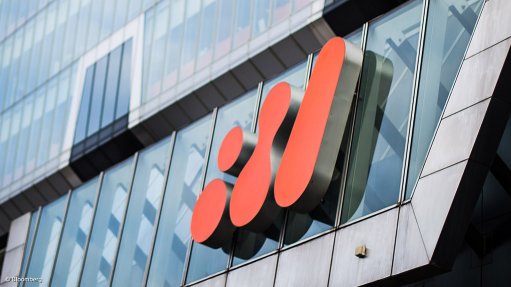
Photo by: Bloomberg
PERTH (miningweekly.com) – Mining major BHP paid some $4.7-billion in global taxes and royalties in the 2017 financial year, with a further $1.2-billion payable to the Australian government in corporate tax income payments before the end of the calendar year.
Australian taxes, royalties and other payments accounted for $3.8-billion of the payments made in the 2017 financial year.
CFO Peter Beaven pointed out in the company’s 2017 Economic Contribution report on Wednesday that over the last ten years, the miner paid some $84-billion in global taxes, royalties and other payments, including $60-billion in Australia alone.
“Communities and governments around the world are focused on whether multinational companies pay their fair share of tax. We are one of the largest taxpayers in Australia and Chile,” Beaven said.
He noted that in the 2017 financial year, the company’s global adjusted effective tax rate was 34%, and once royalties were included, this tax rate increased to 44%.
“This significant contribution of taxation and royalty revenue to the countries in which we operate gives governments the opportunity to provide essential services to their citizens and invest in their communities for the future,” Beavan added.
“Our investment in those economies creates high paying jobs, both directly within our assets and indirectly through our suppliers, which supports the standard of living and further development of those countries.”
During the 2017 financial year, BHP made a total economic contribution of $261-billion through payments to suppliers, wages and employee benefits, as well as dividend payments, taxes and royalties.
In Australia, BHP’s total economic contribution in the 2017 financial year reached $15-billion, with the miner also contributing $4.2-billion in Chile and more than $3-billion in the US.
The miner noted that in addition to the direct economic contributions, the company also invested $4.6-billion into its business through the purchase of property, plant and equipment and exploration spend.
Beaven has called on host governments to ensure an effective tax regime, saying that taxation policy should balance returns to the community with investment incentives.
“Investment requires internationally competitive tax regimes that support the development of new projects, particularly those that are capital intensive and geologically challenging. For a business such as ours, that invests over generations, that also means we need stability of tax regimes.
“We make multibillion-dollar investments that rely on returns in 10, 20 or 30 years’ time. Our assessment of the stability of a tax regime of a particular country is a critical factor in these investment decisions. Where stability is uncertain, the risks to returns on our upfront investment increase and we will require higher returns to invest. Where the risks are too high, we will not invest,” Beaven said.